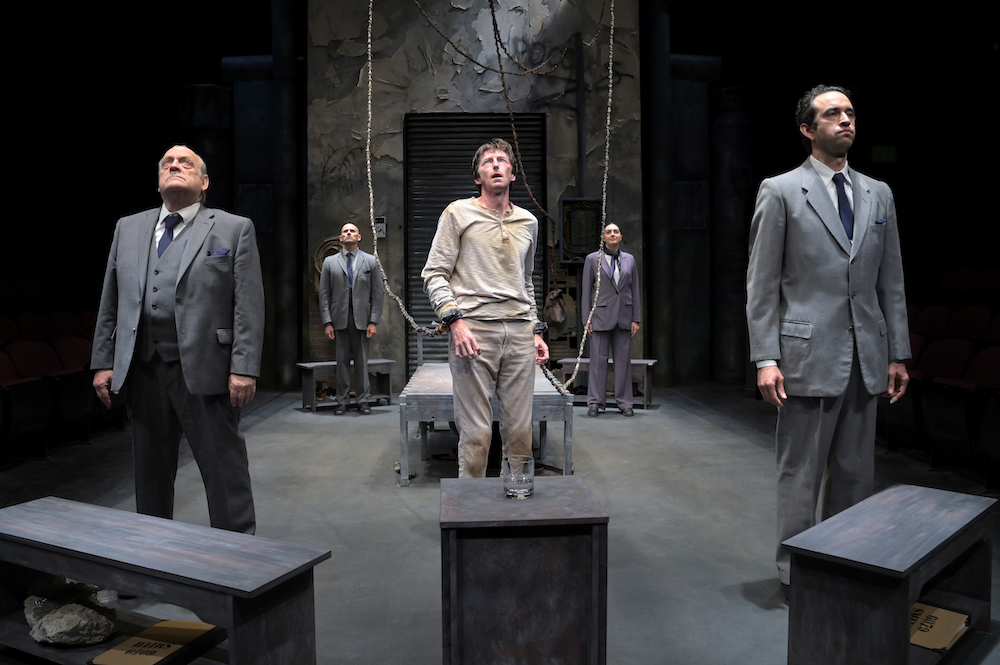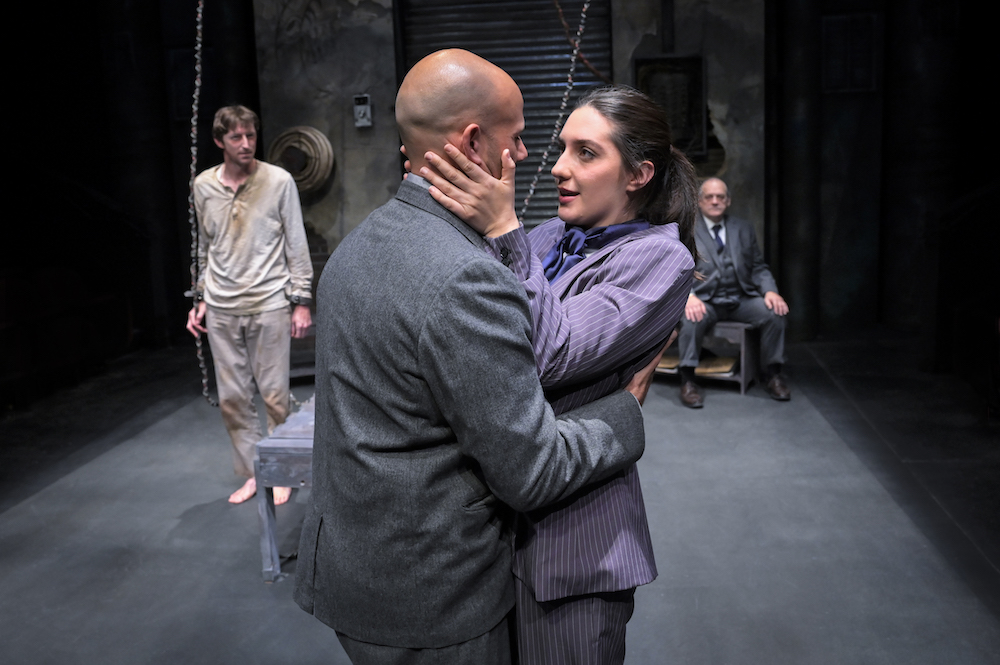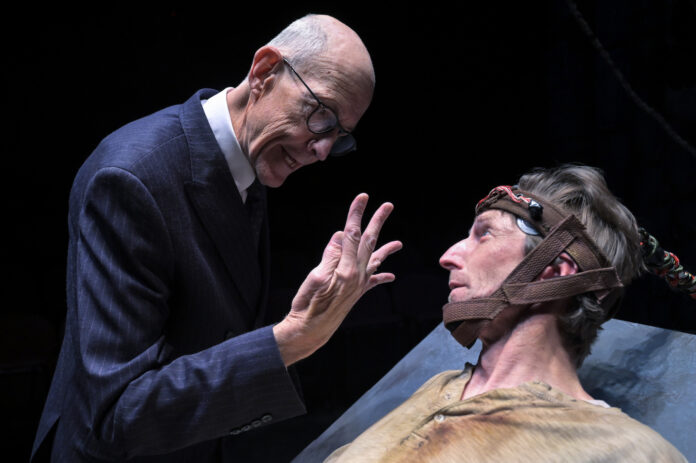When George Orwell wrote 1984, it was in reaction to Nazi scapegoating, media manipulation, and their unconscionable violence committed for the “benefit” of the German people. When Michael Gene Sullivan wrote his stage adaptation, it was in reaction to the US government’s scapegoating, media manipulation, and unconscionable violence (and torture) committed for the “benefit” of the American people. I saw Aurora’s production of Sullivan’s adaptation (through December 10 at the Aurora Theatre, Berkeley) amidst Israel’s scapegoating, media manipulation, and unconscionable violence against Palestine for the supposed “benefit” of the Israeli people (funded by the US taxpayer).
Time really is cyclical.

One wonders why it took almost 20 years for Sullivan’s 2006 adaptation to finally get a Bay Area production, given the playwright’s prominence in Bay Area theatre. Still, the timing couldn’t be any more perfect. Even without the lopsided, pro-Israeli stance taken by mainstream media (which seems to dwarf the War on Terror cheerleading from 20 years ago), we find ourselves in an age where books are banned or burned on a daily basis, where drag queens are more publicly demonized than the January 6 insurrectionists, and when the official response to a still-ongoing worldwide pandemic is to just ignore it.
We’re in 1984, even if it isn’t 1984. We even have omnipresent screens, courtesy of the company that ripped off 1984.
Now that we know the environment in which we find this version of the story, onto the production itself. Jeff Rowlings’ set looks like the dilapidated front of an Eastern Bloc factory, with wonderful details of chipped paint and rust. Flat screens hang above the audience, though it’s a bit disappointing that they never show anything, just illuminate. At centerstage is a wooden bed on which our protagonist, Winston Smith (Joseph Patrick O’Malley in one of the year’s best performances), will spend most of the show. He’s cuffed at both wrists to long wire bundles on opposite ends of the upstage, giving him enough slack to maneuver around the room, but suggesting that he could be drawn and (half-)quartered at any moment.
He’s an enemy of the state and will now answer for his crimes, whatever they may be. As he’s interrogated by a disembodied voice (Warren David Keith), his offenses are reenacted from his journal by the four Party members (Megan Soledad, David Bryant, Daniel Duque-Estrada, and Brady Morales-Woolery) charged with carrying out his sentence.
We learn that Winston was once as loyal to the state as any other citizen, quick to parrot the battle cry of attacking “East Asia” (or is it Eurasia?) for the glory of Big Brother. It’s on an unplanned trip to a junk shop where he buys a piece of coral, not for any practical value, but just for its pure beauty. It’s the first of many steps that that lead news editor Winston to questioning the validity of Big Brother’s messages. He’s further overcome with doubt upon meeting Julia (Soledad), an unabashed nihilist who believes life is not for living on behalf of Big Brother, but for oneself in the moment. As Winston finds himself torn between Julia’s allure and the revolutionary message of the unseen “O’Brien”, one wonders if he’ll live long enough to even have something to live for.

Orwell’s novel is a piece so often copied and homage (I maintain that George Lucas’ shot-in-SF debut feature THX-1138 to the technothriller tv show Mr. Robot) that it can be hard to look at the story on its own merits. Sullivan, who seems to be using the journals as a means of adding Orwell prose into the script, appears to want to both expand and compress the story all at once. He does the latter by tapping into the panic and fervor of The State’s war against its enemy in the midst of an economic crisis. He does the latter by confining the action to this single room. All of this clearly reveals the scripts origins in the Gitmo era, but its strength is in building a world that we the audience will never get to see personally (which is one way in which the faceless flat screens actually work in the play’s favor).
Help us save local journalism!
Every tax-deductible donation helps us grow to cover the issues that mean the most to our community. Become a 48 Hills Hero and support the only daily progressive news source in the Bay Area.
Though the first half could use some pace-adjusting, the second-half is incredibly exciting, and it’s the climax where Sullivan gets to truly distinguish this version. I won’t spoil it here, but he deviates from the book to present a morally uncomfortable vision of how easy it is for one to be radicalized, convinced that they’re on the side of “the good guys”, no matter how reprehensible their actions. It’s an exercise in showing how one can claim to worship a pacifist like Jesus even as they plant explosives in a Planned Parenthood. The genius of this sequence isn’t that truly presents a moral gray area (though it’s easy to get that impression), it’s how everyone tells themselves little lies in order to go through with something they hate. Eventually, those little lies become one big lie—but does that make it the truth?
Speaking of truth, I reiterate my point about the pandemic not being over. Hence my seeing the show during a Sunday masked matinee. The mostly-elderly crowd were pretty good about keeping their masks on when not drinking. At the end of the first act, my Aranet4’s CO² levels hit 1342ppm, which is lower than I’ve previously seen at Aurora. By the end of the show, they were hovering around 1186ppm.
No matter how long it took for this version of the story to make it here, it picked an unfortunately perfect time to do so. Orwell wrote his novel when the titular year seemed a lifetime away, and Sullivan wrote his adaptation at a time when Americans committing atrocities on the other side of the world was seen as something to celebrate. I barely remember the real 1984, but I hate having to live a near-Orwellian version that wants someone like me dead as soon as possible. When the mayor of my hometown is happy to sweep homeless people under the rug to look good for APEC, it’s reason enough to hate this timeline.
The folks at Aurora put on an interesting show, yet my fellow patrons seemed to regard leaving the theatre as walking through the prole section. We all watched the same show, yet they didn’t seem to read between the lines.
1984 Bay Area premiere runs through December 10. Aurora Theatre, Berkeley. Tickets and more info here.





